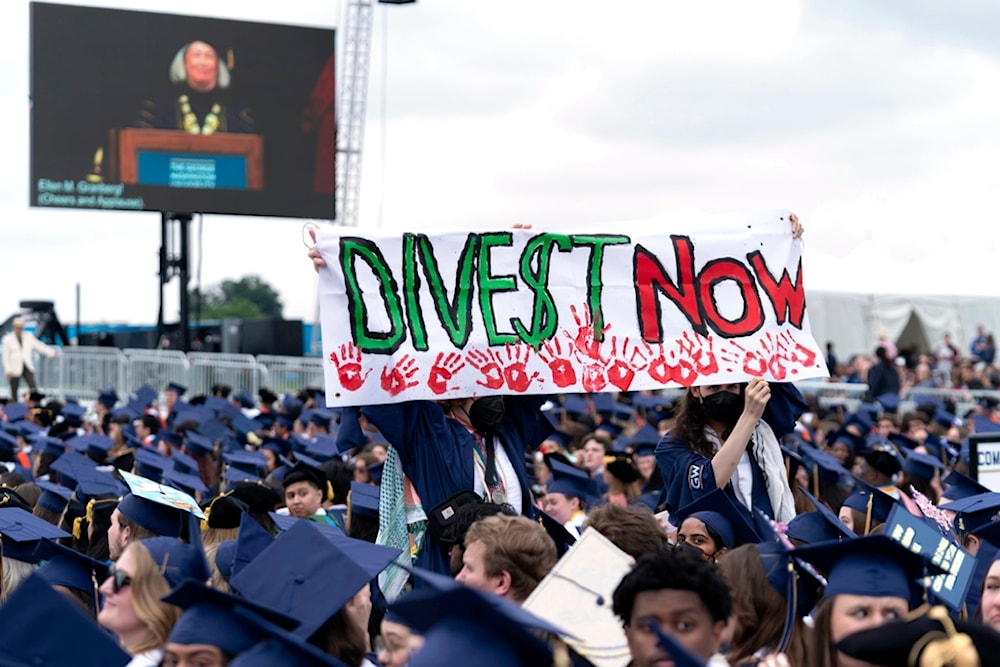Columbia alumni group push for pro-Palestine student deportations
Discussions about reporting protesters to immigration authorities had already been taking place within the group before Trump signed the executive order.
-

George Washington University students carry a sign during a pro-Palestinian protest as George Washington University President Ellen Granberg, pictured on screen, speaks at a commencement ceremony in Washington, Sunday, May 19, 2024 (AP Photo/Jose Luis Magana)
The Intercept on Sunday revealed that a group of Columbia University alumni has been working to identify pro-Palestine student protesters for possible deportation under a directive from President Donald Trump.
The WhatsApp group, Columbia Alumni for Israel, includes more than 1,000 members, such as alumni, parents, at least one current student, and faculty. Messages in the group show coordinated efforts to track, report, and push for legal action against demonstrators, particularly international students.
Discussions about reporting protesters to immigration authorities had already been taking place within the group before Trump signed the executive order. On the day of his inauguration, group members circulated flyers about a planned student walkout advocating for leniency toward anti-war demonstrators.
Former Columbia Teachers College assistant professor Lynne Bursky-Tammam reportedly urged members to document student attendees, writing, "Identifying the Columbia student-Hamas-sympathizers who show up is key to deporting those with student visas."
Victor Muslin, another alumnus and pro-"Israel" activist, offered technological assistance, saying, "If there are photos of someone who needs to be identified (even with a partially obscured face) I have access to tech that may be able to help. DM me."
Read more: Pro-Palestine demonstrators in Berlin detained by German police
Shortly after Trump issued the order, a member of the group posted a link to the US Immigration and Customs Enforcement (ICE) tip line, encouraging others to submit reports. Conversations escalated, with members discussing how to frame activists as threats or link them to alleged hate crimes.
When students protested the anniversary of "Israel's" killing of six-year-old Hind Rajab by vandalizing a building, Bursky-Tammam reacted in the chat, stating, "Arresting them for hate crimes is not enough. We have to get rid of them."
Crackdown Intensifies
The Intercept's report comes amid increasing crackdowns on pro-Palestinian activism in US universities, with Columbia University itself facing criticism for disciplining and suspending student demonstrators.
Pro-Israeli activists have also turned to legal channels to escalate their actions against protesters, including efforts to involve federal law enforcement. According to messages from the WhatsApp group, members actively discussed contacting New York police, the FBI, and other agencies.
Civil rights advocates have condemned the targeting of students. Abed Ayoub, executive director of the American-Arab Anti-Discrimination Committee, warned that such actions set a "very dangerous precedent." He added, "Really, it's an across-the-board attempt to silence and take away the First Amendment right of people simply because they don't agree with them."
Some students named in the chat have also been listed on external platforms such as Canary Mission, which compiles profiles of individuals involved in anti-Zionist activism. The Zionist group Betar reportedly sent the White House and federal agencies a list of students they wanted deported.
Read more: Global uprisings for Gaza: The moral triumph of student revolts
Columbia University's response to the revelations remains unclear, but leaked messages indicate that alumni and donors have been in private talks with school administrators. Heather Krasna, an associate dean of career services at Columbia, hinted at behind-the-scenes efforts, writing, "A lot is happening that is confidential for these and other reasons."
Sabiya Ahamed, a staff attorney with Palestine Legal, said the situation reflects a broader pattern of suppressing pro-Palestine speech. "All of these things that the university has been doing has been normalizing the fact that it is wrong to say something about Palestine," she stated.
As Trump's order takes effect, fears are growing about its potential impact on international student demonstrators across the US.

 4 Min Read
4 Min Read








